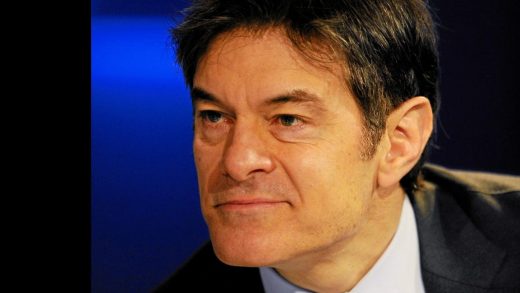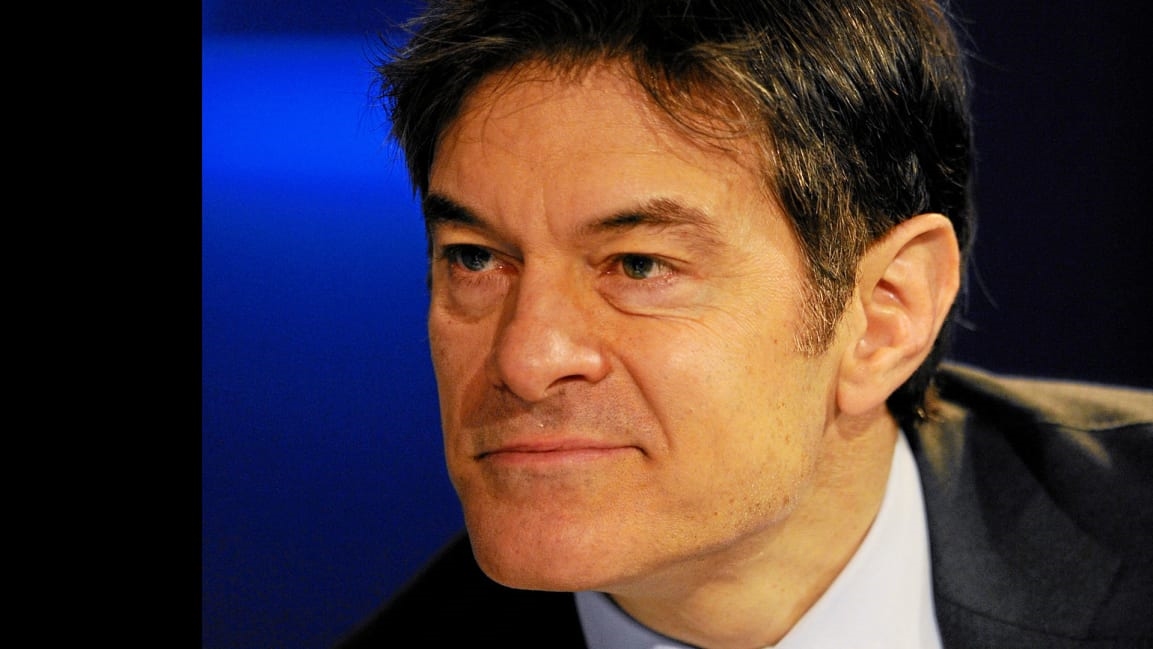Dr. Oz, TV doctor, offers a bad prognosis for Dr. Oz, U.S. Senator
He was canonized by Oprah as America’s Doctor way back in 2004, but that title doesn’t accurately reflect who Mehmet Oz is now. Around the time he landed his own talk show some five years later, Dr. Oz transitioned from being a heart surgeon who occasionally appeared on TV to being a wellness influencer who occasionally performed heart surgery.
For his next act, as announced via Twitter on Tuesday, Dr. Oz is running for U.S. Senate in Pennsylvania. His campaign could be the most dangerous procedure he’s performed yet.
I’m running for U.S. Senate in Pennsylvania because America needs a Conservative Republican to cure what’s wrong with Washington. I’m a world-class surgeon, fighter, and health care advocate stepping forward to cure our country’s ills. Watch my announcement video now! pic.twitter.com/yLhKsZm9sl
— Dr. Mehmet Oz (@DrOz) November 30, 2021
If staggering popularity were all it took to win a Senate seat, Oz could start engraving his nameplate already. He’s won over 20 Emmy Awards for his eponymous TV show; his series of books, starting with 2004’s You: The Owner’s Manual, have sold millions of copies; and in 2008, Esquire listed him as one of the 75 most influential people of the 21st century. Smarts can help a candidacy too, and Oz certainly has those. He graduated from Harvard in the mid-1980s, before eventually joining Columbia University Medical Center, where he earned a reputation as a talented heart surgeon. Over the course of his celebrated career, he cofounded a special cardiac center within Columbia and secured 11 patents.
What might put Oz over the top in a Senate race, though, at least with the fringier element of the GOP base, is that for a doctor, he doesn’t seem especially committed to science.
After marrying his Reiki-master wife, Lisa Oz (née LeMole), Oz became increasingly interested in the alternative therapies that would color the rest of his career. As a 2013 New Yorker profile notes, “With his father-in-law’s encouragement, he began to explore music therapy, energy fields, and therapeutic touch, and he began to offer them to his surgical patients.” When the author of the piece points out that he is not aware of any evidence showing that Reiki, a Japanese form of energy healing, actually works, Oz shoots back: “Neither am I, if you are talking purely about data. But this is one of the fundamental disconnects between Western medicine and what people often refer to as complementary medicine. Not everything adds up.”
Everything certainly does not add up with the vast and sundry catalog of miracle cures that Oz has touted on his TV show, whose junk science has left a long tail of criticism. The show is mainly comprised of weight loss and anti-cancer tips, although occasionally it dabbles in other topics, such as gay conversion therapy and, uh, performing a live brain scan on the Long Island Medium. (No video is available on Oz’s website for either of these episodes, curiously.) A damning study by the British Medical Journal in 2014 analyzed 40 episodes of the show, randomly picked 80 of the 479 health recommendations offered during those programs, and concluded that only 46% of them had any supporting evidence, while 39% had none, and 15% had evidence contradicting them.
In one widely derided episode, Oz touted a green coffee bean supplement as a miracle weight-loss solution, despite the extremely dubious nature of the research behind it, including a study that was later retracted by its authors. The supplement sold so well after gaining Oz’s support that the Federal Trade Commission later sued the suppliers for false advertising, and forced the marketer who had appeared on The Dr. Oz Show to settle with customers for $9 million in 2015.
Incidents like the green coffee bean fiasco have united physicians, surgeons, and other medical professionals against Dr. Oz. In 2015, 10 leaders in the medical community from across the country addressed a letter to Columbia’s dean of medicine, requesting that the university distance itself from “America’s Doctor.” The authors cited Oz as having “repeatedly shown disdain for science and for evidence-based medicine.” In a piece for the peer-reviewed Journal of General Internal Medicine, entitled “Why Dr. Oz Makes Us Crazy,” Dr. Adam S. Cifu asks other doctors to imagine if, like Oz, some of their medical choices were “influenced not only by your desire to impart information, but also by a need to maintain ratings and your lucrative media position.”
As former Senator Claire McCaskill said to Oz during a Senate subcommittee hearing on false and deceptive advertising of weight-loss products: “I don’t get why you need to say this stuff, because you know it’s not true.”
But the reason why Dr. Oz says this stuff is simple: Because it’s his (TV) job. We already know what kind of doctor he is, but what kind of Senator would Mehmet Oz make? He has offered many hints.
Trumpian showmanship
Even before his first appearance on Oprah in 2004, Oz was always reliant on visual aids in a made-for-TV way that Trump would later utilize as a politician. Monique Class, a former employee of the cardiac center Oz cofounded, said that the doctor would commonly say some version of the following to her or other employees: “Give me a patient because the cameras are coming in, and tell me what I need to know.” Oz clearly has a keen understanding of the power of spectacle.
A reliance on manipulative visuals over substance is par for the course for politicians, but Oz’s intertwined history with Trump himself bodes even poorer for the doctor as Senator. In the lead up to the 2016 election, Oz welcomed Trump onto his show to confer legitimacy on the future president’s medical records. While Oz didn’t actually perform a physical—or in any way verify the authenticity of the pieces of paper Trump showed him on air, claiming them as medical documents—he did cosign the then-candidate’s health with a series of cotton-soft questions.
He went on to join President Trump’s Council on Youth Fitness in 2018.
Inability to take responsibility
When Dr. Oz his been called out for promoting junk science in the past, his responses have not exactly been models of accountability. In a Time magazine piece from 2015, he waged a proto-cancel culture argument, writing, “I know I have irritated some potential allies. No matter our disagreements, freedom of speech is the most fundamental right we have as Americans. We will not be silenced.” He doesn’t just label criticisms of his show as attempts to silence him; he wages paranoid counterattacks against the character of his critics, accusing both the lead author of the Columbia letter and the author of that 2013 New Yorker profile as having biases. (Sound familiar?) He’s also trotted out ridiculous excuses for his conduct, at one point suggesting that The Dr. Oz Show can’t be considered a medical show because the word “doctor” is rendered in tiny type in the logo. This lack of integrity is not becoming of a doctor, much less a Senator, although it’s not exactly uncommon in the latter.
An insider trading risk
Although Oz is careful never to endorse any specific brands, he is quite obviously aware of the profound impact an appearance on his show has on sales. (It’s what lawmakers have enshrined as the “Dr. Oz Effect.”) Wealthy as he may already be, Oz has at least one documented instance of using his media platform to promote a treatment just before it hit the market. As detailed in Vox, the doctor made $1.17 million between 2013 and 2014 from helping to develop a hemorrhoid treatment he later promoted in his syndicated column. Although not technically illegal, it is the kind of opportunity he would find himself facing a lot more often as a sitting senator.
Impossible to trust in a crisis
When Dr. Oz dedicated the bulk of an episode in 2014 to the extremely remote possibility of the Ebola virus going airborne, it was just a warmup for the kind of irresponsibility he would emit during the pandemic. In March of 2020, just as America was waking up to the true threat of COVID-19, Oz was on The Today Show recommending fruits and vegetables to shore up immunity against the coronavirus. Even several months later, when social distancing and face masks had emerged as the top options to protect against catching COVID, Oz was still prescribing treatments like meditation and exercise alongside hand sanitizer. To his credit, Dr. Oz his been a strong proponent of vaccines, but his conduct overall during the pandemic has mainly affirmed the Columbia letter’s concerns that by promoting unproven remedies for serious ailments, Dr. Oz had “misled and endangered” people.
With the only certainty in America’s future being more medical crises to come, he is not someone who should have a leadership role in the U.S. government.
Fast Company , Read Full Story
(90)



